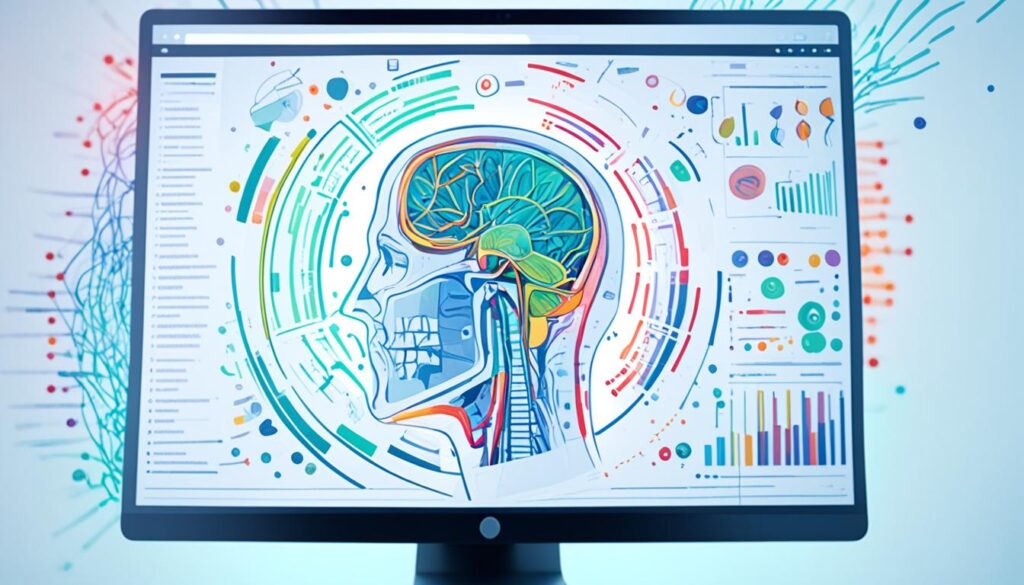Artificial intelligence (AI) and machine learning have paved the way for groundbreaking advancements in various fields, including healthcare management. With their potential to transform the industry, AI applications are revolutionizing the way healthcare is delivered, improving efficiency, reducing costs, and enhancing patient care.
AI applications in healthcare management leverage the power of data to make informed decisions and streamline operations. From cost-saving applications to personalized care and fraud prevention, AI is reshaping the landscape of healthcare management.
In this article, we will explore the diverse AI applications for healthcare management, the role of AI in reducing healthcare costs, enhancing diagnostic accuracy, providing personalized care, improving operational efficiencies, ensuring data security and compliance, and the promising future of AI in healthcare.
Transforming Healthcare with AI
Artificial intelligence (AI) is revolutionizing the healthcare industry by transforming the way healthcare is managed. With its ability to optimize processes and improve efficiency, AI plays a vital role in reducing healthcare costs and improving patient outcomes. Let’s explore the different ways AI is reshaping healthcare.
The Role of AI in Reducing Healthcare Costs
One of the key benefits of AI in healthcare is its cost-saving potential. By leveraging AI technologies, healthcare providers can optimize resource allocation, streamline administrative processes, and improve revenue cycle management. AI-powered predictive analytics can accurately forecast patient demand and optimize resource utilization, leading to cost efficiencies and improved service delivery.
Cost-Saving AI Applications
AI applications have proven to be instrumental in reducing healthcare costs. Through advanced algorithms and machine learning, AI can analyze vast amounts of data and identify patterns that can guide cost-saving strategies. For example, AI-powered solutions can analyze patient data and identify high-risk individuals who would benefit from preventive interventions, reducing the likelihood of expensive hospitalizations and long-term care.
Furthermore, AI can automate and optimize administrative processes such as appointment scheduling, billing, and claims processing. By streamlining these processes, healthcare organizations can reduce administrative expenses, minimize errors, and improve workflow efficiency.
AI-Assisted Robotic Surgery and Its Impact on Costs
AI-assisted robotic surgery is revolutionizing the field of surgery, leading to improved outcomes and cost savings. By combining the precision of robots with AI capabilities, surgeons can perform complex procedures with greater accuracy and efficiency. This technology reduces the need for large surgical teams, decreases the length of hospital stays, and minimizes the risk of complications, ultimately resulting in cost savings for both patients and healthcare providers.
Minimizing Medication Dosage Errors Through AI
Medication dosage errors can have serious consequences for patient safety and can also incur unnecessary costs. AI-powered systems can minimize the risk of medication errors by automating the medication management process. These systems can cross-reference patient data, identify potential interactions or contraindications, and provide alerts to healthcare professionals, ensuring accurate and safe medication administration.
Streamlining Administrative Processes to Reduce Expenses
Administrative processes, such as appointment scheduling, medical coding, and billing, can be labor-intensive and time-consuming. By implementing AI-powered solutions, healthcare organizations can automate these processes and reduce expenses associated with manual labor, human error, and inefficiency. AI can improve accuracy and speed, ultimately resulting in cost reduction and improved revenue management.
Table 2: Examples of Cost-Saving AI Applications in Healthcare
| AI Application | Benefits |
|---|---|
| Predictive Analytics for Resource Allocation | – Optimized resource utilization – Improved patient outcomes – Cost efficiencies |
| Automated Medication Management | – Minimization of medication errors – Improved patient safety – Cost reduction |
| Robotic Surgery with AI Guidance | – Enhanced surgical precision – Reduced complications – Decreased length of hospital stay |
| Workflow Automation in Administrative Processes | – Time and cost savings – Minimized human errors – Improved efficiency |
Enhancing Diagnostic Accuracy
Diagnostic accuracy is a crucial aspect of effective healthcare. AI technologies are revolutionizing the field by enhancing the accuracy of diagnosis through improved image analysis and enabling early detection of diseases. AI algorithms can analyze medical images with unmatched precision, identifying patterns or anomalies that might be overlooked by human clinicians. This ensures timely and accurate diagnoses, leading to better patient outcomes.
Improving Efficiency in Image Analysis with AI
AI-powered systems have significantly improved the efficiency of image analysis in healthcare. These systems can rapidly analyze medical images, such as X-rays, MRIs, and CT scans, to detect abnormalities and assist in diagnosis. By automating the image analysis process, AI reduces the time required for clinicians to interpret complex images, allowing them to focus more on patient care. This not only enhances efficiency but also minimizes the chances of human error in diagnosis, leading to improved diagnostic accuracy.

Early Detection and Preventive Care Using AI
Early detection plays a crucial role in effective healthcare management, as it enables proactive interventions and preventive care. AI-powered systems can analyze vast amounts of patient data, including medical history, genetic information, and lifestyle factors, to identify individuals at risk of developing certain diseases. By recognizing early warning signs, healthcare providers can intervene at an early stage, offering targeted preventive care and empowering patients to take proactive measures to manage their health. This approach not only improves patient outcomes but also reduces healthcare costs by minimizing the need for expensive treatments and hospitalizations.
Personalized Care and Management
Virtual Nurse Assistants: Bridging the Care Gap
AI enables personalized care and management through virtual nurse assistants that bridge the care gap between patients and healthcare providers. Virtual nurse assistants utilize AI algorithms to provide patients with personalized support, guidance, and monitoring, improving patient outcomes and reducing the need for frequent in-person visits. These virtual nurse assistants act as companions, offering continuous care and monitoring while ensuring that patients receive timely and appropriate interventions. By leveraging AI technology, healthcare providers can extend their reach beyond the confines of traditional care settings, enabling patients to access personalized care and support remotely.
Customizing Healthcare Plans with AI for Cost Efficiency
AI plays a crucial role in customizing healthcare plans to optimize cost efficiency. By analyzing patient data and employing machine learning algorithms, AI can identify patterns and insights that enable personalized healthcare plan recommendations. These customized plans take into account individual patient needs, preferences, and risk profiles, ensuring that resources are allocated effectively and efficiently. AI can help identify cost-effective preventive measures, streamline treatment plans, and reduce unnecessary procedures or tests, ultimately improving patient outcomes while minimizing healthcare costs.
| Benefit | Reason |
|---|---|
| Improved Patient Outcomes | Personalized care plans address patients’ specific needs, leading to better outcomes and overall satisfaction. |
| Optimized Resource Allocation | AI helps healthcare providers allocate resources efficiently, reducing wastage and unnecessary expenditures. |
| Cost Savings | Customized healthcare plans minimize unnecessary procedures, tests, and hospitalizations, resulting in significant cost savings. |
| Enhanced Patient Engagement | Personalized care plans foster patient engagement and empowerment, as patients feel actively involved in their healthcare decisions. |
Operational Efficiencies and Fraud Prevention
A crucial aspect of leveraging AI in healthcare management is improving operational efficiencies and preventing fraud. By implementing AI-powered systems, healthcare organizations can streamline their back-office processes, resulting in cost reduction and enhanced accuracy. Moreover, AI algorithms play a vital role in detecting and preventing fraudulent activities by analyzing extensive healthcare data and identifying suspicious patterns for further investigation.
AI in Back-Office Efficiencies and Cost Reduction
AI-powered systems offer significant improvements in back-office efficiencies, leading to substantial cost reductions for healthcare organizations. These systems automate labor-intensive tasks such as claims processing, billing, and coding, which not only save time but also enhance accuracy. By leveraging AI, healthcare providers can streamline administrative processes, optimize resource allocation, and improve overall operational efficiency, ultimately resulting in cost reduction and improved financial performance.
Detecting and Preventing Fraud with AI in Healthcare
One of the major challenges in the healthcare industry is the occurrence of fraudulent activities. AI plays a crucial role in detecting and preventing fraud by analyzing large volumes of healthcare data and identifying patterns or anomalies that could indicate fraudulent behavior. AI algorithms can flag suspicious claims or activities, allowing healthcare organizations to take appropriate actions and mitigate financial risks. By harnessing the power of AI, fraud prevention measures can be significantly strengthened, safeguarding the financial wellbeing of healthcare providers and ensuring trust and transparency in the industry.

| Benefits of AI in Back-Office Efficiencies and Fraud Prevention | |
|---|---|
| 1. | Streamlined administrative processes through automation |
| 2. | Optimized resource allocation and cost reduction |
| 3. | Enhanced accuracy and efficiency in claims processing |
| 4. | Early detection and prevention of fraudulent activities |
| 5. | Improved financial performance and risk management |
Security and Compliance
With the increased use of AI in healthcare, ensuring data security and compliance is of utmost importance. AI-powered healthcare systems must adhere to strict security and privacy protocols to protect patient data from breaches or unauthorized access. Compliance with healthcare regulations and standards, such as HIPAA, is necessary to maintain patient trust and uphold ethical practices.
Ensuring Data Security
Robust cybersecurity measures and data encryption help safeguard sensitive healthcare information. By implementing industry best practices, healthcare organizations can protect patient data from cyber threats and unauthorized access. This includes measures such as advanced firewalls, secure data storage, frequent security audits, and employee training on data security protocols.
Compliance with Regulations
Compliance with healthcare regulations is crucial to ensure the ethical and lawful use of AI-powered healthcare systems. Organizations must adhere to regulations such as the Health Insurance Portability and Accountability Act (HIPAA) in the United States. HIPAA establishes standards for the protection and privacy of patient health information, including electronic health records. Compliance with these regulations helps maintain patient trust and ensures that healthcare providers are using AI in a responsible and ethical manner.
Trust and Ethical Practices
Building trust with patients is essential in healthcare, especially when utilizing AI-powered systems. Healthcare organizations should prioritize transparency in their use of AI and communicate the benefits and risks to patients. This includes obtaining informed consent for data usage and ensuring patients have control over their personal health information. When data security and compliance are prioritized, it fosters trust between patients and healthcare providers, enabling the effective and responsible use of AI in healthcare.
| Data Security | Compliance |
|---|---|
| Robust cybersecurity measures | Adherence to healthcare regulations |
| Data encryption | Compliance with HIPAA |
| Frequent security audits | Informed consent for data usage |
| Employee training on data security | Patient control over health information |
The Future of AI in Healthcare
The future of AI in healthcare holds great potential for sustainable healthcare savings. By investing in AI technologies, you can drive cost savings through improved efficiency, optimized resource allocation, and enhanced patient outcomes.
Investing in AI for Sustainable Healthcare Savings
With AI-powered systems, healthcare providers can automate manual processes and streamline operations, leading to significant cost reductions. AI algorithms can analyze large amounts of data, identify patterns, and make accurate predictions, enabling you to optimize resource allocation and minimize waste. By leveraging AI, you can improve the overall efficiency of your healthcare organization and achieve sustainable long-term savings.
AI’s Long-Term Impact on Healthcare Decisions for Middle-Aged Populations
AI has a profound impact on healthcare decisions, especially for middle-aged populations. By analyzing extensive patient data, AI-powered systems can provide personalized recommendations for preventative care, disease management, and treatment strategies. This personalized approach not only leads to better health outcomes but also helps reduce healthcare costs in the long run. With timely interventions and tailored treatment plans, middle-aged individuals can proactively manage their health, preventing costly complications and hospitalizations.
In conclusion, the future of AI in healthcare is bright. By investing in AI technologies and leveraging its capabilities, you can achieve sustainable healthcare savings while improving patient outcomes. Embracing AI’s potential will allow you to make data-driven decisions, implement personalized care strategies, and create a more patient-centric healthcare system. As the field of AI continues to evolve, healthcare providers have an opportunity to transform the industry and drive positive change for middle-aged populations and beyond.
